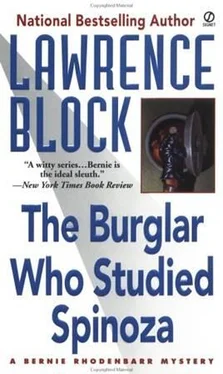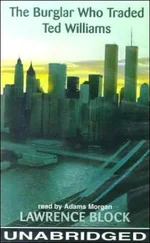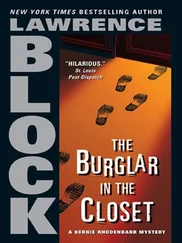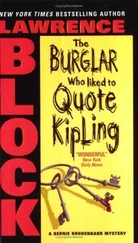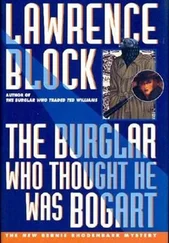His sister Marilyn was in the first row all the way over on the right. She was dressed quite sedately in a black skirt and dark-gray sweater, but all the same she looked like a whore in church. The man sitting beside her, a round-faced lumpish lout, had to be Harlan Reese.
Denise and Carolyn were sitting together all the way at the back. Carolyn was wearing her blazer. Denise had a sweater on, but I couldn't see whether she was wearing pants or a skirt. No smock, though, and no smile.
As chief mourner, Jessica Garland sat front row center, with Clay Merriman on her left. A pity we hadn't all met before this unhappy occasion, I thought. Abel could have had us all over of an evening, Clay and Jessica and Carolyn and I, and we could have fattened up on pastry while he regaled us with stories of Europe between the wars. But, oddly, he'd never mentioned a granddaughter.
Three men in dark suits sat together at the right of the third row. The one closest to the center was tall and balding, with a long nose and very thin lips. Beside him sat the oldest of the trio, a gentleman about sixty with wide shoulders, snow-white hair and a white mustache. The third man, seated on the aisle, was a small and slightly built fellow with a button nose and thick eyeglasses.
I had never seen them before but I was fairly certain I knew who they were. I paused long enough to meet the eyes of the white-haired man in the middle, and while his face did not change its stern expression he gave a short but distinct nod.
At the opposite end of the second row sat another man I recognized. Oval face, clipped mustache, slate-gray hair, little mouth and nose-I'd seen him before, of course, but Jessica had known where to put him because Herbert Franklin Colcannon had obligingly worn a carnation in his lapel.
I winced when I saw it. Somehow with all the running around I'd done I hadn't remembered to get to a florist before they closed. I suppose I could have let myself into a shuttered flower shop that very morning, but the act seemed disproportionately risky.
Anyway, I'd just introduced myself to the company. So Colcannon knew who I was.
"We're told our good friend made his living as a receiver of stolen property," I began. "I, however, knew him in another capacity-as a student of philosophy. The writings of Spinoza were particularly precious to Abel Crowe, and I would like to read a brief passage or two as a memorial to him."
I read from the leatherbound copy we'd given to Abel, the copy I'd retrieved Friday and had subsequently packed in my attaché case the following night. I read a couple short selections from the section entitled "On the Origin and Nature of the Emotions." It was dry stuff, and my audience did not look terribly attentive.
I closed Spinoza, placed the book on the lectern, and opened the other volume I'd brought along, one I'd selected last night from Abel's shelves.
"This is a book of Abel's," I said. "Selections from the writing of Thomas Hobbes. Here's a passage he underlined from Philosophical Rudiments concerning Government and Society: 'The cause of mutual fear consists partly in the natural equality of men, partly in their mutual will of hurting; whence it comes to pass that we can neither expect from others nor promise to ourselves the least security. For if we look on men full-grown, and consider how brittle the frame of our human body is, which perishing, all its strength, vigor and wisdom itself perisheth with it; and how easy a matter it is even for the weakest man to kill the strongest; there is no reason why any man trusting to his own strength should conceive himself made by nature above others. They are equals who can do equal things one against the other; but they who can do the greatest thing, namely kill, can do equal things.'"
I skipped to another marked passage. "This is from Leviathan, " I said. "'In the nature of man, we find three principal causes of quarrels. First, competition; second, diffidence; thirdly, glory. The first maketh man invade for gain, the second for safety, and the third for reputation.'"
I placed Hobbes with Spinoza. "Abel Crowe was killed for gain," I announced. "The person who killed him is right here. In this room."
It was not without effect. The whole crowd seemed to draw breath at once. I fixed my eyes for the moment on Carolyn and Denise. They'd known what was coming but my announcement had gotten to them just the same, and they'd drawn a little closer together as if the drama of the moment had obscured their loathing for one another.
"Abel was murdered for a nickel," I went on. "People are killed every day for trifling sums, but this particular nickel was no trifle. It was worth something like a quarter of a million dollars." Another collective gasp from the crowd. "Tuesday night Abel came into possession of that coin. Twelve hours later he was dead."
I went on to tell them a little about the history of the five legendary 1913 V-Nickels. "One of these nickels wound up in the safe of a man who lived in a carriage house in Chelsea. The man and his wife had left town and weren't expected back until the following day. Tuesday evening, while they were gone, a pair of burglars broke through the skylight and ransacked the carriage house."
"We didn't take no nickel!" Heads swiveled and eyes stared at Rabbit Margate. "We never took no nickel," he said again, "and we never opened no safe. We found the safe, sure, but we couldn't punch it or peel it or nothing. I don't know shit about no nickel."
"No."
"And we didn't kill nobody. We didn't hurt nothing. Wasn't nobody home when we went in, and we went out again before nobody came home. I don't know shit about no murders and no nickels."
He slumped in his seat. Ray Kirschmann turned to whisper something to him, and Rabbit's shoulders sagged in dejection. I don't know what Ray said, probably pointed out Rabbit had just admitted the burglary in front of God and everybody.
"That's true," I said. "The first burglars. Rabbit Margate and Harlan Reese"-and didn't Harlan look startled to hear his name spoken aloud-"contented themselves with burglary and vandalism. Not long after they left, a second burglary took place. This burglar, a considerably more sophisticated and accomplished individual than Margate and Reese, went directly to the wall safe, opened it, and removed a pair of earrings, a valuable wristwatch, and the 1913 nickel. He took them directly to Abel's apartment, where he left them on consignment."
No point, really, in mentioning we'd obtained some cash for the watch and earrings. No need to tell these people every last detail.
"While the second burglar was delivering the safe's contents to Abel Crowe, the nickel's owner and his wife were returning to their home. They'd had a change of plans that none of the burglars had any reason to be aware of, and so they walked in on a house that looked like Rome after the Goths sacked it. They also walked in on another burglary in progress, and this third burglary was the charm. The man and woman were knocked out and tied up, and when the man regained consciousness and worked free of his bonds he discovered that his wife was dead."
I looked at Colcannon. He returned my glance, his face quite expressionless. I had the feeling he'd have preferred to be almost anywhere else, and I don't suppose he figured he was going to have the chance to buy his coin back, not this afternoon. He looked like a man who wanted to walk out of a bad movie but had to stay to find out what happened next.
"The nickel's owner called the police, of course. He was given the opportunity to look at the perpetrator of the second burglary but couldn't identify him. Subsequently he did make a positive identification of one of the participants in the first burglary."
"That was a frame," Rabbit Margate called out. "He never saw me. That was a setup."
Читать дальше
